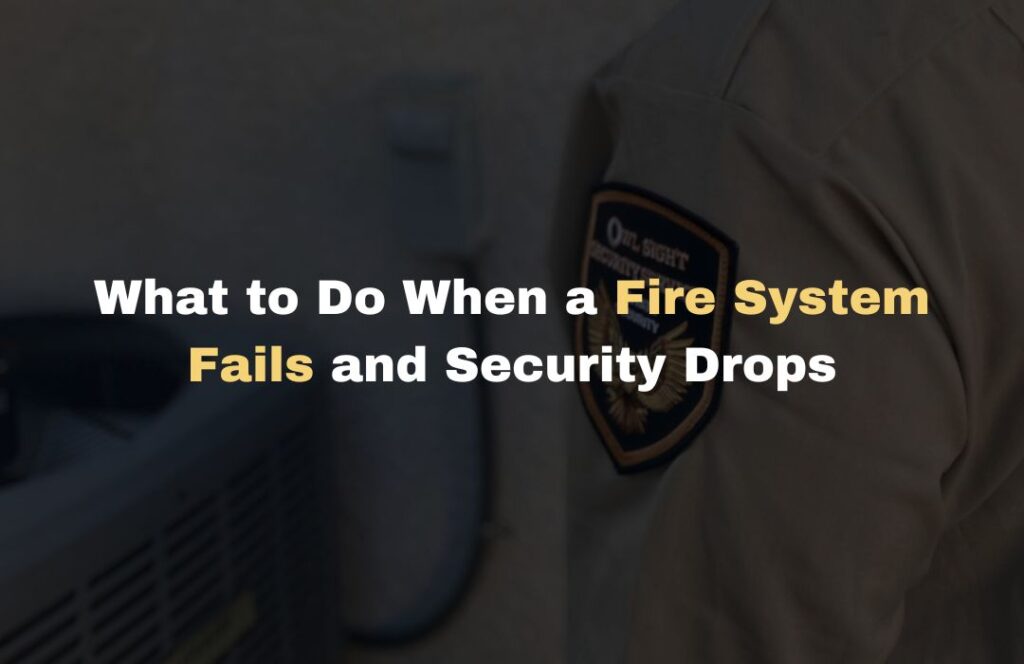
When a fire system fails, the risk profile of a property changes immediately. Alarms, sprinklers, or suppression systems that normally provide protection are no longer reliable, and response times become uncertain. During these periods, many property owners rely on security guards for fire watch to maintain life safety oversight, monitor conditions, and reduce exposure until systems are restored.
Knowing what to do when a fire system fails and security drops requires fast, structured action rather than relying solely on repairs to resolve the risk.
Why Fire System Failures Create Immediate Risk
Fire protection systems are designed to detect, contain, and alert before a fire spreads. When those systems fail, early warning disappears and small hazards can escalate quickly.
Electrical issues, construction work, system upgrades, or accidental damage often cause failures. During downtime, properties become vulnerable to undetected smoke, unauthorized activity, and delayed emergency response.
The longer a system remains offline, the greater the exposure to safety violations and liability.
How Security Gaps Worsen During System Downtime
Fire system failures often coincide with reduced staffing or limited oversight, especially after hours. Without alarms or automated alerts, hazards rely entirely on human observation.
Security gaps appear when no one is assigned to actively monitor fire-prone areas, mechanical rooms, or high-risk operations. This creates blind spots where problems go unnoticed until damage occurs.
Understanding what to do when a fire system fails and security drops means recognizing that downtime without oversight increases risk far beyond the original malfunction.
Immediate Actions Property Managers Should Take
When a fire system fails, response must be immediate and coordinated.
Critical actions include:
- Notifying local authorities and fire officials as required
- Identifying the scope and duration of the system outage
- Restricting high-risk activities such as hot work
- Assigning personnel to continuously monitor fire hazards
- Documenting all interim safety measures
These steps reduce exposure while repairs are underway.
Why Fire Watch Guards Are Required During Failures
Fire watch guards provide continuous, active monitoring when automated systems are unavailable. Their role is to patrol designated areas, identify hazards, and respond immediately if conditions become unsafe.
Guards check for smoke, overheating equipment, blocked exits, and unauthorized activity that could increase fire risk. Their presence ensures someone is always watching when technology cannot.
This coverage is central to what to do when a fire system fails and security drops, because it replaces automated protection with human oversight.
How Fire Watch Coverage Prevents Escalation
Fire watch coverage prevents small hazards from becoming emergencies. Guards intervene early, notify emergency services if needed, and help occupants evacuate safely when conditions require it.
Their documentation also demonstrates compliance with local codes and insurance requirements. This record protects property owners from claims related to negligence during system downtime.
Consistent patrols create accountability and reduce uncertainty throughout the outage period.
Coordinating Fire Watch With Repairs and Operations
Fire watch coverage must align with repair timelines and building operations. As work progresses, risk levels change and coverage requirements may adjust.
Guards coordinate with contractors, maintenance teams, and management to ensure protection remains continuous. This coordination prevents gaps during shift changes, inspections, or partial system restorations.
Clear communication ensures safety remains intact from failure to full repair.
Why Professional Fire Watch Is a Safety Requirement
Fire watch is not a formality. It is a safety requirement designed to protect lives, property, and compliance standing.
Professional fire watch guards are trained to recognize hazards, follow emergency procedures, and maintain detailed logs. Their presence reassures occupants and regulators that safety remains a priority even during system failures.
Owl Sight Security Services provides trained fire watch professionals who understand code requirements, patrol procedures, and emergency response protocols. Their structured approach helps properties remain compliant and protected during critical system outages.
Failing to understand what to do when a fire system fails and security drops often results in citations, liability exposure, and preventable damage.
Frequently Asked Questions
What qualifies as a fire system failure?
A fire system failure includes any condition where alarms, sprinklers, or suppression systems are partially or fully inoperable.
Is fire watch required when a system is down?
Fire watch is often required by local authorities and insurers when systems are offline for extended periods.
How long must fire watch remain in place?
Fire watch remains in place until the fire system is fully restored and approved for operation.

